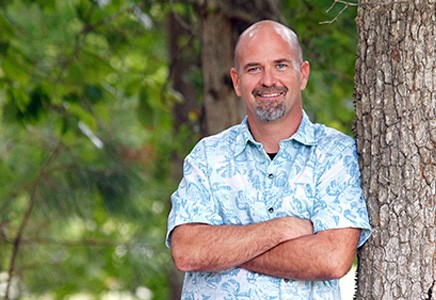
“Being in nature got me very interested in not only wanting to do something to protect it, but to also have a career where I could spend more time outside,” Conley said.
Nature: All in a day’s work
Scott Conley, an environmental engineer for Jefferson Lab, grew up the son of an outdoorsman, and the grandson of a half-Cherokee grandmother. Stories of nature - listening to nature, and readings its signs - filled his childhood. “I can see the bottom of the leaves on the trees,” Conley said, re-enacting the first time he heard this lesson from his father. “That means the pressure is changing and it’s probably going to storm.”
Born in Newport News and raised in Hampton, Virginia, Conley grew up fishing and hunting alongside his dad, who worked for the shipyard. Immersed in nature, Conley became fascinated with biology early on. He was always drawn to “the interactions of things in nature and animals,” Conley said. “I’ve always had a close connection to them.” After high school, Conley studied environmental science at the University of North Carolina - Wilmington, where he met his wife, also an environmental consultant, and spent 14 years of life there becoming a subject matter expert. In March 2010, he discovered a position at Jefferson Lab that would allow him to move back to his hometown and work within his interests.
Environmental stewardship at its best
Conley’s days are busy with various types of missions. After a cup of tea, he is off tackling his to-do lists which range from crafting reports to the Commonwealth, proper waste disposal, contaminant assessments, Erosion & sediment control inspections, and pollution prevention monitoring. His job also includes educating the scientists and staff at Jefferson Lab on environmental-friendly best management practices.
Guided by regulations set by the Virginia Department of Environmental Quality (VDEQ), Environmental Protection Agency, the National Environmental Policy Act (NEPA), and the Resource Conservation and Recovery Act (RCRA), Conley’s job is to lessen the footprint, or environmental impact of Jefferson Laboratory operations, by working with the scientists and staff to characterize or profile waste, ensure proper disposal, and report the technical approaches and processes to the State. "There is world-class research going on here,” Conley explained. “Any given day you can be in the room with genius physicists and that’s just amazing.”
But Conley’s job is to guarantee the research they are doing, which can sometimes produce contamination materials, is not harming the environment. After reviewing drawings and project specifics, Conley confirms everything that will be generated is disposed of safely and per regulations so that the research may continue without environmental repercussions. “We have to do our due diligence,” Conley said, mentioning that Jefferson Lab is responsible for its waste stream from the cradle to the grave. “We check all of the boxes to make sure it’s not going to impact the environment.” Those boxes include monitoring the environment around Jefferson Lab. Testing the ground water and soil, quarterly, bi-annually or annually. These are checkpoints, a way of listening to the environment around the lab and monitoring how it’s reacting to any activity done by the lab.
“We have to treat our staff here like we’re our own small town,” Conley said. “We teach about management practices, and finding environmentally-friendly alternatives.” Conley’s hopes for the lab are to become even more self-sustaining, continue in-depth and impactful education, and reducing the lab’s footprint. “Once you know, you can’t ignore it,” Conley said, talking of improper disposal of environmental contaminants or behaviors that lead to harming the environment.
Life at home & The Green Team
Husband to Amy, and father to a young son and daughter, Scotty and Jasmine - who think their dad’s job is to “keep the water clean” - Conley enjoys sharing time with them. The family attends Brazilian jiu-jitsu classes together, around three times a week. Conley also enjoys surfing, a hobby he’s pursued since he was 12. “There is nothing more humbling than the ocean,” Conley commented.
Conley said he’s always aimed for a fulfilling life, one full of nature, faith, a solid career, and seeing his family prosper. A fan of music, ranging from reggae to blues and gospel, he is thankful for a job that intermingles work with his passions. A direct example of this intermingling is The Green Team, which happens to be the name of the Jefferson Lab Environmental Management Team, a name proposed by Conley, voted on, and accepted by the team. But it also happens to be the name of his college band where he played the drums. “The team doesn’t know that,” Conley said, laughing and making a note to tell them about his environmentally-friendly band days.
Conley’s life is full of protecting the environment by day, and enjoying activities with family during time off. A dream he once wished for while spending time with his dad on the water’s edge. “This job has helped me prosper: to do the things I like to do and watch my family prosper too,” Conley said. “I just want to keep making this lab a better place.”
As an environmental engineer, Conley helps the lab with pollution prevention and environmental regulatory compliance. First, the generator of a waste has to be able to explain what the waste is made of. If the waste or any part of it is identified as hazardous then a hazardous waste technician has to safely collect and store the waste. After scheduling a pickup with the waste management vendor, the waste is carefully transported to be neutralized or disposed of. Jefferson Lab’s Environmental Protection Program is outlined in the 8000 chapters of the ES&H Manual.
Link: https://www.jlab.org/ehs/ehsmanual/8000.html
Every year the lab produces a Site Environmental Report; they are archived at: https://www.jlab.org/ehs/ser/

